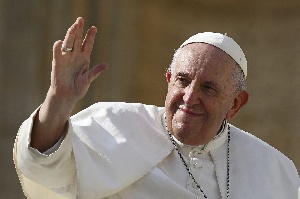- Home - News
- Elections 2024
- News Archive
- Crime & Punishment
- Politics
- Regional
- Editorial
- Health
- Ghanaians Abroad
- Tabloid
- Africa
- Religion
- Photo Archives
- Press Release
General News of Monday, 21 April 2025
Source: www.ghanawebbers.com
Pope Francis: Why his papacy mattered for Africa – and for the world’s poor and marginalised
Pope Francis died in an Italian hospital on 21 April 2025. His death marks the end of a significant era for the Vatican. He led a global Catholic community of 1.3 billion faithful.
Pope Francis was elected on 13 March 2013. He was the first pope from the Americas and outside the West in modern times. By then, many felt the Catholic Church was nearing an end of an era.
The church faced numerous crises, including corruption and clerical sexual abuse. Pope Benedict XVI struggled with issues like a Holocaust-denying bishop's readmission and corruption in the Vatican Bank. There were also multiple cases of clerical abuse worldwide.
Additionally, confusion arose over English translations of church texts. Revelations about papal secrets by Benedict’s butler embarrassed the church greatly. Cardinal Bergoglio was elected to clean up these scandals and reform the Vatican.
Three key aspects defined his papacy and legacy. First, he focused on serving the poor and marginalized, following Jesus Christ's example. He emphasized helping those in need and addressing global inequalities.
Second, he changed how the church communicated its message. In his document Evangelii Gaudium, he called for "missionary conversion." He believed everything should focus on proclaiming good news to a broken world.
His central message included mercy for all, ending wars, and recognizing our common humanity. He highlighted suffering caused by injustice and greed through symbols like celebrating mass at a border wall.
In 2015, he took a risky trip to Bangui during civil unrest in Central African Republic. He traveled with both Muslim and Christian leaders to promote peace between factions.
Thirdly, he restructured the church and reformed the Vatican Bank. He created a G8 council of cardinals from around the world for advice. This unprecedented move aimed to encourage dialogue within every aspect of church life.
He made synod procedures more participatory by giving women voting rights. Notably, he appointed Sr Simone Brambilla as head of a major Vatican department with a cardinal deputy.
Pope Francis had a profound impact on Africa as well. His messages addressed imperialism, colonialism, exploitation, global inequality, and ecological injustice.
During his visit to Kenya in 2015, he spoke out against poverty in Nairobi's slums. He urged African governments to ensure access to land and labor for all citizens.
He encouraged African Catholics to develop unique approaches to pastoral life while decentralizing decision-making processes within local communities.
Pope Francis supported greater transparency among bishops and allowed African universities more autonomy in education programs.
He connected deeply with Africa’s youth by supporting initiatives that empower them spiritually and professionally. On 1 November 2022, he met virtually with over 1,000 young Africans for an hour-long discussion.
His reforms represented a shift towards inclusivity within the church community where everyone’s voice matters. While maintaining traditional teachings often seen as conservative or Eurocentric, he opened doors for marginalized voices like women and LGBTQI+ individuals.
Many African Catholics desire increased representation at the Vatican amid cultural divisions affecting unity within their communities.
Pope Francis was notable as the first Jesuit pope from outside Europe who chose his name based on St Francis’ dedication to helping others.
He redefined religion for Catholicism by emphasizing care for neighbors rather than strict law enforcement without mercy—an approach needed today.











